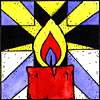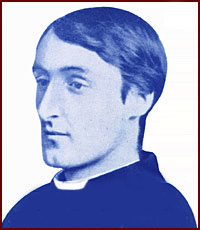| |
|
|
| Herbert, George |
|
[ top ]
|
 |
| |
|
|
 |
|
George
Herbert, as an eminent example among the "metaphysical
poets" of the 17th Century, was an Anglican pastor; when
George Herbert wrote "The Temple", England knew momentous
political, religious and social changes; it was a period of
transition discernible even in poetry. Herbert's pieces of poetry
display a quiet and sincere piety, although the poet is also
prone like Hopkins later to a pervasive religious realism which
finds its expression in the lyricism of his own inner torments.
Devotional verse might be so, at first, defined as such a sanctifying
fight which reveals that a personal encounter with God and a
personal experience of sin are concomitant. Herbert's willingness
to know himself better or to be closely akin to himself dictates
the very attitude of the poet towards love, death and God. In
Herbert's poetry, the soul takes refuge against the dread of
infinite space in the intimacy of the human heart, but instead
of being concentrated on the contemplation of some precious
object, the poet's mind is wide-open to the diversity of the
real and to all the adventures of man's wit. |
| |
|
|
|
The Altar
A broken ALTAR, Lord, thy servant
rears,
Made of a heart, and cemented with tears :
Whose parts are as thy hand did frame ;
No workman's tool hath touched the same.
A HEART alone
Is such a stone,
As nothing but
Thy pow'r doth cut.
Wherefore each part
Of my hard heart
Meets in this frame,
To praise thy Name :
That, if I chance to hold my peace,
These stones to praise thee may not cease.
O let thy blessed SACRIFICE be mine,
And sanctify this ALTAR to be thine.
|
|
L'autel
Ton serviteur, Seigneur, dresse un AUTEL
brisé,
Bâti d'un cœur et cimenté de larmes ;
Chaque partie est ce que ta main a créé ;
Nul outil d'ouvrier ne prit part à l'ouvrage.
Seul un CŒUR
Est une telle pierre,
Que rien sinon ta
Puissance ne taille ;
C'est pourquoi chaque partie
De ce cœur endurci
En vient en ce corps
A louer ton nom :
Que, s'il m'arrive de m'abstenir de parler,
Ces pierres puissent ne cesser de te glorifier.
Oh fasse que ton bienheureux SACRIFICE soit mien,
Et sanctifie cet AUTEL afin qu'il soit tien.
|
| |
| |
|
|
| |
|
|
| Hopkins, Gerard Manley |
|
|
 |
| |
|
|
|
|
|
Gerard Manley Hopkins, as a
19th-century poet, converted in his youth to "the religion
of the Real Presence", recapitulated the features of
the preceding religious poets and heralded modern poetry.
Hopkins' precocious and artistically sensitive disposition,
encouraged by the family who bred him, was nourished by a
constant interest and a critical curiosity about the poets
who preceded or accompanied him throughout the Victorian period;
to his friend and privileged reader, Robert Bridges, at a
time when Hopkins' poetry seemed too obscure to the Poet Laureate,
the Jesuit Father said that he would orient his literary works
to the understanding of future generations. The fact that
his poems, by courtesy of Bridges who published them, have
found an audience only nearly thirty years after his death
would prove it, in a way. As important as the posthumous publications
of his work, Hopkins' conversion to Catholicism is unavoidable
if we want to understand the quite revolutionary dimension
of the poet. Like Herbert, the parson, Hopkins considered
his priesthood in the Company of Jesus as the first and maybe
last thing that did matter in his life; he dedicated his poetry
entirely to the glory of God.
|
| |
|
|
| The last sonnets of Hopkins show
an extraordinary lucidity about his own life; as if aware of
his near death, he writes his sonnets of desolation like a kind
of testament which keeps the marks of a man who suffered a lot
from loneliness. His faith in God seems to be mostly marred
but, far from him is the idea of apostasy. God's presence is
throughout Hopkins' literary work perceived and experimented
by a constant use of his reason, the discursive reason of the
clear-sighted analyst he was, an element which should prevent
us to define him as a mystic. There is no doubt that Hopkins
may now appear anachronistic as a person and priest; though
very proud of his country, as a matter of fact, the poet belonged
to the times of greater changes and the irresistible whirlwind
of his inner struggles heralded the feeling of absurdity which
would reign in the first decades of the century shaken by the
two first World Wars. Hopkins' message can do nothing but give
way to a new impetus of Christianity in a form that challenges
the classical methods of writing, by granting greater importance
to "orality" and to the call of poetry licences that
modern poetry fully adopted. To draw a last parallel between
Herbert, Hopkins and Blake introduced as my favourites poets,
I would say that Blake wanted to re-define religion, the sense
of God and His action in the world whereas Hopkins as well as
Herbert wanted to re-create God's action in the world in order
to reinforce the sense of His presence. |
| |
|
|
| |
|
|
Thou
art indeed just, Lord, If I contend
With thee; but, sir, so what I plead is just.
Why do sinners' ways prosper? and why must
Disappointment all I endeavour end?
Wert thou my enemy, O
thou my friend,
How wouldst thou worse, I wonder, than thou dost
Defeat, thwart me? Oh, the sots and thralls of lust
Do in spare hours more thrive than I that spend,
Sir, life upon thy cause.
See, banks and brakes
Now, leavéd how thick! lacéd they are again
With fretty chervil, look, and fresh wind shakes
Them; birds build - but
not I build; no, but strain,
Time's eunuch, and not breed one work that wakes.
Mine, O thou lord of life, send my roots rain.
March 17, 1889
|
|
Oui, juste es-tu, Seigneur,
si je dispute avec
Toi; mais, ô maître, aussi juste est mon plaidoyer.
Pourquoi prospèrent-elles les voies des pécheurs?
Et
Pourquoi toutes mes tentatives finissent par l'échec?
Serais-tu mon ennemi,
toi qui es mon ami,
Comment ferais-tu pire, je me demande, sinon
Par revers et traverses? Oh, l'ivre esclave du vice
Avance plus à ses heures perdues que moi, ô mon
Maître, qui use
ma vie pour ta cause. Vois les rives
Foisonnent d'épais halliers! leurs festons revenus
De cerfeuil frisé, regarde, le vent frais les rive
Au sol; les oiseaux bâtissent
leurs nids, mais moi, nul
Nid, mais force, eunuque du temps, engendre nulle oeuvre vive.
Mien, toi Dieu de vie, donne aux racines miennes tes nues.
|
| |
|
|
| Goethe, Johann Wolfgang
v. |
|
 |
| |
|
|
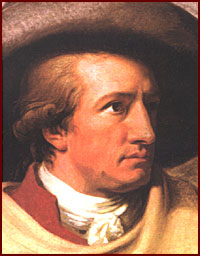 |
|
Please
listen to Brahms, who set these three stanzas only into music,
and hear how Goethe's despair has been well rendered! Together
with his German Requiem and a Rhapsody with Hölderlin's
Fate song, Brahms let us imagine how Goethe reached, during
this lonely trip in the mountains of Harz, a certain level of
mysticism. May the poet's prayer be our prayer! |
| |
|
|
| |
| |
|
|
|
Harzreise im Winter
Dem Geier gleich (...), schwebe mein Lied!
(...)
Aber abseits wer ist's?
Ins Gebüsch verliert sich sein Pfad,
Hinter ihm schlagen
Die Sträucher zusammen,
Das Gras steht wieder auf,
Die Öde verschlingt ihn.
Ach, wer heilet die Schmerzen
Des, dem Balsam zu Gift ward?
Der sich Menschenhass
Aus der Fülle der Liebe trank!
Erst verachtet, nun ein Verächter,
Zehrt er heimlich auf
Seinen eigen Wert
In ungnügender Selbstsucht.
Ist auf deinem Psalter,
Vater der Liebe, ein Ton
Seinem Ohre vernehmlich,
So erquicke sein Herz!
Öffne den umwölkten Blick
Über die tausend Quellen
Neben dem Durstenden
In der Wüste!
|
|
Le voyage du Harz en hiver
Pareil au vautour (...), plane mon chant!
(...)
Mais qui se tient là à l'écart ?
Dans les broussailles se perd son sentier,
Derrière lui
Les buissons se referment,
L'herbe relève ses tiges,
La désolation l'engloutit.
Ah, qui peut guérir
les souffrances
De celui pour qui le baume fut poison,
Ayant bu la haine des hommes
Dans la plénitude de l'amour ?
D'abord trahi, le voici traître à son tour,
Qui consume en secret
Sa propre valeur
En un égoïsme inassouvi.
S'il y a sur ta harpe,
Père d'amour, un accord
Sensible à son oreille,
Console son cœur !
Dévoile au regard embrumé
Les mille sources
Près de l'être assoiffé
Dans le désert !
|
|
| |
|
|
| Blake, William |
|
|
 |
| |
|
|
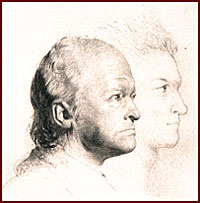 |
|
In
advance of what the Industrial Revolution presented as signs
of apocalyptic collapse, such as the gradual rural migration
towards the ghettoes of the new cities and the pauperization
of the urban districts of the working-class, Blake turned his
eyes towards the poor and the outcast; as a poet, he "chanted"
the sanctity of home and the sweetness of childhood; In the
Songs of Innocence, we can guess the original state of the soul;
an image of that perfect condition of being is, according to
William Blake, the condition of childhood, in which a state
of happiness, unity and enjoyment always prevails, even among
some pangs and pains, for a child can and usually does vent
his spleen on an adult. In the Songs of Experience, the soul
has eaten the Forbidden Fruit from the Tree of Knowledge; all
the previous states described in the heaven of innocence are
now destroyed and become as many hells of experience, a condition
presaging disillusion, cruelty and death. From the Songs of
Innocence to the image of a bride-like city descending upon
earth when called by the Spirit, Blake chose the Incarnation
as a main theme of his poetry; but the Incarnation on Blake's
lips rather means the tragic feeling of life. |
|
| |
|
|
|
The Lamb
Little Lamb, who made thee ?
Dost thou know who made thee ?
Gave thee life, and bid thee feed,
By the stream and o'er the mead ;
Gave thee clothing of delight,
Softest clothing, wooly, bright ;
Gave thee such a tender voice,
Making all the vales rejoice ?
Little Lamb, who made thee ?
Dost thou know who made thee ?
Little Lamb, I'll tell thee,
Little Lamb, I'll tell thee :
He is calléd by thy name,
For He calls himself a Lamb.
He is meek, He is mild ;
He became a little child.
I a child, and thou a Lamb,
We are calléd by His name.
Little Lamb, God bless thee !
Little Lamb, God bless thee !
1789, Songs of Innocence
|
|
L'agneau
Petit Agneau, qui t'a créé
?
Sais-tu seulement qui t'a fait,
Donné de naître et vivre et paître,
Au bord de l'eau et sur le pré;
Donné de revêtir délices
Et douceur de laine et lumière;
Donné de vibrer d'une tendre voix,
Jusqu'à combler de joie tout val ?
Petit Agneau, qui t'a créé ?
Sais-tu seulement qui t'a fait ?
Petit Agneau, tu vas l'entendre,
Petit Agneau, tu vas l'entendre:
De ton nom, il est appelé,
Car Lui-même s'est dit Agnelet.
Il est humble et doux, tout autant;
Et Il se fit petit enfant.
Et moi, l'enfant, et toi, l'agneau,
Nous sommes appelés de Son nom.
Petit Agneau, Dieu te bénisse !
Petit Agneau, Dieu te bénisse !
1789, Chants d'Innocence
|
| |
|
|
| Crashaw, Richard |
|
|
 |
| |
|
|
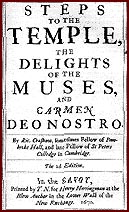 |
|
As a European literary movement, Metaphysical Poetry also derives from a philosophical background based on the concept of « teatra mundi » ; whereas drama is,
according the high baroque poet, understood in terms of spectacle, it is, according to the metaphysical poet, rather treated as essence. At any rate, England knew momentous political, religious and social changes.Crashaw
himself belonged, like Donne also and later Hopkins, to the
numerous poets who experimented in their own life a conversion.
But more important than the confession itself, which everyone
chose, is according to me the way which brought to such a vision
of the world. For Crashaw, this spiritual way had also something
to do with journeys and stays throughout Europe, as if the search
of God, the unique God, was only a better way of being acquainted
with man's versatile nature, at last, or vice-versa.
|
|
| |
|
|
| |
|
|
|
Upon Our Saviour's Tomb
Wherein Never Man Was Laid
How Life and Death in thee
Agree !
Thou had'st a virgin Womb
And Tomb.
A Joseph did betroth
Them both.
|
|
Sur la Tombe de Notre
Sauveur
Où Jamais Homme ne Fut Déposé
Oh, que ne sont-elles en Toi, la Vie et la Mort,
D'accord !
Vierges te sont le Sein de ta mère et, au comble,
Ta Tombe.
Un Joseph les choisit pour objet de ses voeux
Tous deux.
|
| |
|
|
| Trakl, Georg |
|
|
 |
| |
|
|
 |
|
One
of the peculiarities of Trakl's poems is the presence of autumn
landscapes at the countryside and the hope of a mystical sense
of life. The beauty of nature with its calming rhythm of cycles
however fails, where gruesome death comes up in daily life.
Be it an aspect of Expressionism or not, this fascination of
madness and of the impossible in Trakl's poetry reminds us of
his personal experience of horror at the beginning of World
War One, as he had to nurse a lot of injured and did not succeed
in looking at so much suffering. |
|
| |
|
|
| |
|
|
|
Der Herbst des Einsamen
Der dunkle Herbst kehrt ein voll Frucht und Fülle,
Vergilbter Glanz von schönen Sommertagen.
Ein reines Blau tritt aus verfallener Hülle;
Der Flug der Vögel tönt von alten Sagen.
Gekeltert ist der Wein, die milde Stille
Erfüllt von leiser Antwort dunkler Fragen.
Und hier und dort ein Kreuz auf ödem
Hügel;
Im roten Wald verliert sich eine Herde.
Die Wolke wandert übern Weiherspiegel;
Es ruht des Landmans ruhige Gebärde.
Sehr leise rührt des Abends blauer Flügel
Ein Dach von dürrem Stroh, die schwarze Erde.
Bald nisten Sterne in des Müden
Brauen;
In kühle Stuben kehrt ein still Bescheiden
Und Engel treten leise aus den blauen
Augen der Liebenden, die sanfter leiden.
Es rauscht das Rohr; anfällt ein knöchern Grauen,
Wenn schwarz der Tau tropft von den kahlen Weiden.
|
|
L'automne du solitaire
L'automne obscur revient, des fruits à profusion,
Splendeur toute jaunie des belles journées d'été.
Un bleu pur sort des feuilles tombées de la foison;
Le vol d'oiseaux résonne de légendes éloignées.
Le vin est mis en cave, et à d'obscures questions,
Le doux silence répond rempli de bruits légers.
Et çà et là
une croix sur une colline déserte;
Dans une forêt pourpre, un troupeau vient se perdre.
Le nuage chemine, miroité dans l'étang;
Cela calme le geste calme du paysan.
Presque sans aucun bruit, l'aile bleue du soir frôle
Un toit de chaume sec, la terre noire au sol.
Bientôt, des étoiles nichent aux sourcils
des suées;
Un homme, modeste et calme, balaye de frais préaux
Et des anges quittent sans bruit les yeux bleus des amants,
Lesquels souffrent un peu plus soulagés maintenant.
Le roseau bruisse au vent; surgit l'horreur des os
Quand, noire, la rosée tombe des pâturages pelés.
|
|
